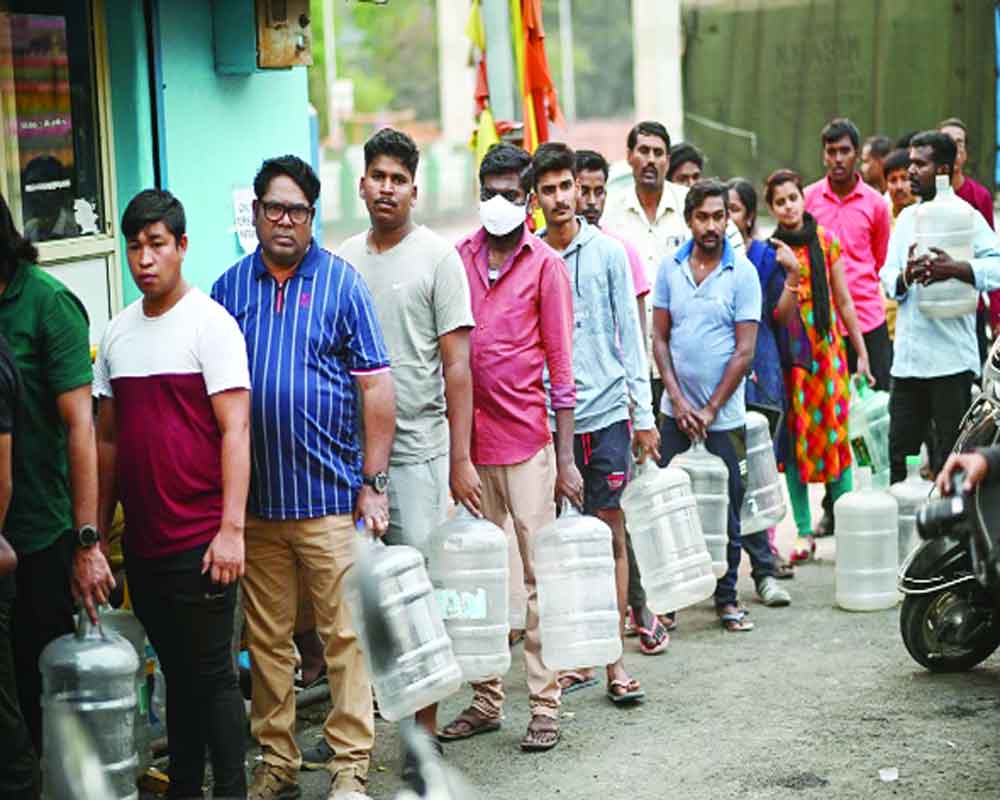India stands on the precipice of a dire situation as its water reservoirs dwindle and cities like Bengaluru face a looming Day Zero scenario
The World Water Day (WWD) 2024 coordinated by UN-Water was observed on 22 March. The WWD event every year aims at inspiring action to tackle the global water crisis. A core focus of WWD is to enable the achievement of Sustainable Development Goal (SDG) 6 which stands for enabling access to clean water and sanitation for all by 2030. This year’s WWD’s theme ‘Water for Peace’ focuses on the critical role of water in ensuring stability and prosperity of the world. Water is a precious resource that covers 70% of our planet, but only 3% of the world’s water is usable fresh water, and even two-thirds of that is in the form of frozen glaciers and therefore unavailable for use.
India is witnessing a rather grim WWD eve this year. According to the latest Central Water Commission (CWC) report, more than half of India’s 150 major water reservoirs are having less than 40% inventory. Patchy rainfall due to El Niño has caused nearly 60% of the country to experience inadequate rainfall coupled with this the spiralling demand for water due to increasing population has meant rampant and reckless exploitation of available water resources.
These conditions aided by the upcoming summer months are paving the way for a never before water crisis India has ever seen. This possible squeeze on drinking water may also adversely impact power availability this summer.
Water is the most precious and yet most taken-for-granted resource in the world. Currently, some 1.1 billion people worldwide lack access to water, and a total of 2.7 billion find water scarce for at least one month of the year. At the present consumption rate, this situation will only get worse. India currently has 18 per cent of the world’s population, but only 4 per cent of its water resources, making it among the most water-stressed nations in the world.
As India finds itself amid an unfolding water crisis, the stress is becoming more visible with each passing year. The extreme water shortages in Bangalore for instance is an unfortunate example of how on the eve of WWD the garden city has turned into a drought city. The situation is so dire that families only have access to 20 litres of water per day as 6900 borewells out of 13900 total borewells in the city have dried up. Now even drilling up to 2000 feet is not yielding any water. The worst water crisis in the last 40 years has driven up water tanker prices, encouraged black marketing and ignited water conflicts across the once-beautiful city. For a city that is on the brink of Day Zero, the WWD’s theme of “Water for Peace” holds ironic significance for Bengaluru as the city surely needs both water as well as peace now.
Day Zero for water has been the most feared consequence of adverse anthropogenic intervention into the environment. The Cape Town water crisis during 2017-2018 is a well-documented example of a city’s touch-and-go with Day Zero wherein the citizens were rationed a fixed number of litres of water per day. The cause of the crisis was severe drought brought on by climate change and a growing exploitation of groundwater. The Bengaluru water crisis must wake up India to the real threat of looming Day Zero for water in its major cities. Already Hyderabad municipal authorities too have sounded alarms over the dwindling groundwater table.
The scarcity of water can bring a city or state’s economy to its knees. Riding on the present water crisis, Bengaluru is expected to witness an exodus of IT professionals to nearby cities that have plentiful water supply. This will not only negatively impact the IT industry but will also stunt the growth of the real estate market, trade and industry.
The government must launch special programmes to pull back water-stressed cities in India from the edge of drought. To ensure this the city’s municipal authority must bring borewells under a licensing system and those borewells operating without proper permissions must be sealed. Water meters must be installed for borewells as well to monitor the drawing of water and to rationalise the same. The government must also regulate the drilling companies and make it mandatory for the drillers to obtain permission before the procedure.
The city’s concrete landscape also plays a major role in water scarcity. The manifold increase in paved surfaces causes a heat island effect resulting in peaking temperatures, but more importantly, prevents rainwater from percolating into the soil. This causes insufficient water recharges to the underground aquifers and groundwater table. As a result of this, the borewells begin to dry up. Bengaluru for instance has 90% of its surfaces paved, this is alarming as it means that the rainfall that the city receives is never properly absorbed. The authorities across India must frame rules regarding paved surfaces.
The city’s water bodies are its lifelines. In the case of Bangalore for instance the slow death of its lakes over the past decades should have served as a prediction for the impending Day Zero for water. But sadly, the signs were ignored even as the land-grabbing mafia encroached on lake beds and suffocated the critical water bodies. To prevent the abandonment of the city by its people, the government must reclaim its water bodies clear the encroachment and pump water into these lakes as they have played a pivotal role in recharging the city’s underground aquifers forever.
Bangalore is probably the first city in India that is on the brink of Day Zero. The government must pull out all stops to rescue the city. The long pending fresh water piped supply project from the Cauvery River has been stuck due to various political and bureaucratic reasons. The metamorphoses of water-scarce conditions to water-absent conditions can be disastrous for our nation.
(The author is a policy analyst. The views are personal)


























